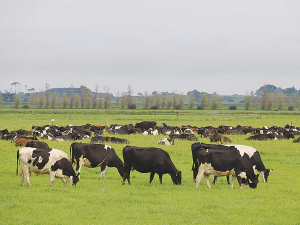Glut in global milk supply keeping prices down
The final Global Dairy Trade (GDT) auction has delivered bad news for dairy farmers.
 Grass growing conditions over the summer months will be another key variable to this season’s milk price.
Grass growing conditions over the summer months will be another key variable to this season’s milk price.
Dairy prices dipped last week after three consecutive rises but economist Nathan Penny, Westpac, says the dip is likely to be temporary.
He says it’s assumed that the 2% drop in Global Dairy Trade’s whole milk powder prices last weeks is Covid-related.
Global daily cases have hit fresh record highs recently, forcing parts of Europe to go back into lockdown.
Penny says these developments are likely to dampen global dairy demand and thus prices, at least temporarily.
“With that in mind, we note that China and the rest of Asia have led the rebound in dairy demand and prices, and on that front, Covid developments are more benign.
“Accordingly, we anticipate that the dip in dairy prices is likely to prove temporary.”
Last week’s price dip surprised the market with the futures market forecasting a 1% rise.
ASB economist Nathaniel Keall says while there is some disappointment to see the winning streak end at the auction, prices are moving less dramatically than they were earlier in the year.
“Back then we saw some real rollercoaster moves up and down,” says Keall.
Keall notes that GDT volumes remain stubbornly down on year-ago levels. The total volume sold at last week’s auction fell about 8% compared to the same time last year. Volumes sold have been down on year-ago levels at every auction since the beginning of July, after rising sharply earlier in the year as buyers rushed to secure supply amid fears of wide-scale Covid-related supply chain disruption and a slowdown in international trade.
He says the shape of the contract curve is shifting too.
“Over recent auctions there has been a bit of a ‘kink’ in the curve, with demand for nearer-dated contracts much higher.
“At the latest auction, the curve shifted in the opposition direction, with demand lower at the nearer term and then rising out to longer dates.”
He says this might suggest buyers have built up good stockpiles for the time being after the lifts over recent auctions.
ASB is retaining its $6.75/kgMS forecast for the 2020-21 season.
Watching how grass grows
Grass growing conditions over the summer months will be another key variable to this season’s milk price, says Nathaniel Keall, ASB economist.
Last month NIWA released its seasonal outlook for the beginning of summer, confirming that New Zealand is highly likely to experience La Niña weather conditions.
Keall says La Niña conditions are typically associated with above average temperatures across the country and near-normal rainfall conditions in the upper North Island, but can also mean lower-than-average rainfall in the rest of the country.
“That should mean grass growing conditions are good in the Waikato but much weaker elsewhere.
“Milk production is currently running about 3% of last year, and we continue to expect it to finish the season higher, but there is the real risk it could taper off if things really dry-off.”
The Meat Industry Association of New Zealand (MIA) today announced that Chief Executive Officer Sirma Karapeeva has resigned from the role.
The winners of the 2026 Hawke’s Bay/Wairarapa Dairy Industry Awards were announced at the annual awards dinner held at Copthorne Solway Park in Masterton on Thursday evening.
Environment Southland is welcoming this week’s decision by the Environmental Protection Authority (EPA) to approve the release of Blaptea elguetai, a leaf‑feeding beetle that will help control the highly invasive Chilean flame creeper.
This March, the potato industry is proudly celebrating International Women’s Day on 8 March alongside the International Year of the Woman Farmer, recognising the vital role women play across every part of the sector — from paddocks and packhouses to research, leadership, and innovation.
Fruit trader Seeka posted a record profit and returns to shareholders in 2025.
Recent weather events in the Bay of Plenty, Gisborne/Tairawhiti, and Canterbury have been declared a medium-scale adverse event.
OPINION: Staying with politics, with less than nine months to go before the general elections, there’s confusion in the Labour…
OPINION: Winston Peters' tirade against the free trade deal stitched with India may not be all political posturing by the…